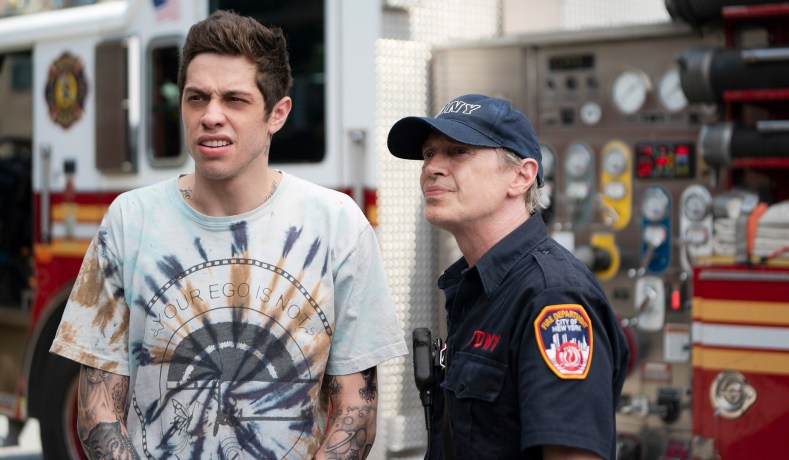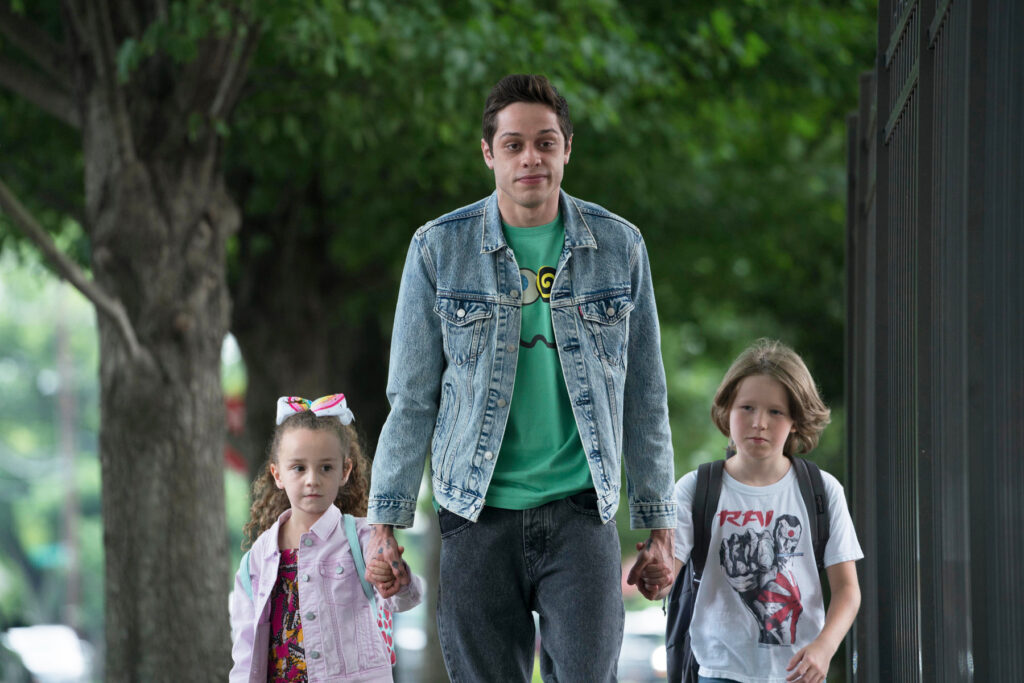There are several wonderful surprises in Judd Apatow’s latest effort, “The King of Staten Island.” Pete Davidson, known more for his SNL chops, can act very well, and brings a very personal story to comedic relevance. The movie also features a fun, young cast (with some additional favorites), and, with the exception of Apatow’s own daughter Maude, doesn’t recycle many of the characters from his older films. But first and foremost, “The King of Staten Island” shows Apatow hasn’t lost a step since his last writer/director production, “This is 40.” The film brings laughs in the right places, emotion where needed, and anchors the film with needed empathy and understanding.
The basic premise of the film is that Scott (Davidson) is stuck in burnout mode at 24, and can’t move on with his life. Several things contribute to this, such as his sister (Maude Apatow) graduating high school and leaving for college, but more so due to his father, who was a firefighter, dying on the job when Scott was 7. Scott has the typical quarter-life-crisis approach: covered in tattoos, he spends his days kicking around abandoned sites, drinking and smoking pot with his friends, who seem to ride the fine line between rebel and lawlessness. Among them is Scott’s ‘girlfriend’ Kelsey—a Staten Islander with dreams of studying urban planning in NYC to finally put Staten Island into the standing it deserves—only Scott keeps her hidden from others in his life, with a mixed bag of excuses that all seem to find different ways of saying, “I’m not good enough.”
Others players, such as Scott’s mother (played by Marisa Tomei) and a love interest for her (Bill Burr)—who is also a fireman—round out the picture.
What works about “The King of Staten Island” is the humorous yet dramatic way Apatow and the cast ground the film in reality. First, there’s the fact that Davidson helped to co-write the script, based off of losing his own father, who was a firefighter during 9/11, that casts a pallor of seriousness over it. Scott, along with his friends, joke that it doesn’t bother him. He shrugs it off; but it isn’t until his mother starts dating Ray, that his long-repressed feelings are able to finally seethe to the surface. “[Being a fireman] is fine if you don’t have kids,” Scott quips to Ray and his work friends, “so that way you don’t crush them when you don’t come home that one time.”

That’s not to say that Apatow has lost himself, or refuses to find opportunities for humor. Some scenes, such as when Scott begins walking Ray’s kids to school every morning, or jokes at Scott’s expense over his lack of artistry skills—Scott’s dream is to be a tattoo artist, but his friends have long grown weary of his inconsistent work and letting Scott practice on them—bring laughs in bucketfuls. Other scenes, such as a talk Scott has with Ray’s ex-wife, and an ensuing physical fight he has with Ray later, buffer the film in moments of slapstick and levity to round out the film’s seriousness.
The acting performances are all apt, and despite their motley crew arrangement, are perfectly cast. Tomei, who I’ve always liked, does a great job playing a mother-figure exhausted from Scott’s arrested development. Likewise Bill Burr, as Ray, is likable and relatable, especially during some of the film’s later scenes that take place at a firehouse. Apatow layers his film with some more symbolic elements this time around, such as Scott learning respect for his father’s profession, as well as a scene of revelry at a bar with these men, scored with The Wallflowers’ “One Headlight;” like Jacob Dylan, Scott realizes the gravity of the shoes left behind by his father. Interestingly, there’s also the surprising addition of Steve Buscemi, who restrains himself and turns in a lovable character with both wisdom and relatability.
The other absolute joys of “The King of Staten Island” are the performances by Maude Apatow, as Scott’s sister Claire, and Bel Powley, as Scott’s girlfriend Kelsey. Maude and Davidson have great chemistry, and we see that, now grown up, Apatow can really act, and under Claire’s irritation with Scott is a love that is palpable and real. And Powley brings life to Kelsey that flies in the face of convention: beautiful and young, she has a sincerity and love of Staten Island (and Scott) that has a healing power all its own. One can’t help but watch “The King of Staten Island” and fall in love with its namesake’s appeal; like Scott, it has a potential and charm just waiting to be unwrapped.
All-in-all, “The King of Staten Island” is marvelous. Pete Davidson brings an authenticity and sweetness to a role that could have been slapstick in lesser hands, and the film hits notes in all the right places to be a respectful coming of age story. As is usual with Apatow, the film also isn’t one sided: Scott isn’t the only one to grow during the film, but as is Kelsey, Ray, and Scott’s mother. The film’s close, silhouetted against skyscrapers in NYC, gives the sense of Scott’s growth and purpose. But, packed with hysterical humor and heavy doses of empathy, Apatow once again creates a picture that makes life’s ups and downs relatable and funny at the same time. A win for all involved and a definite recommend.


